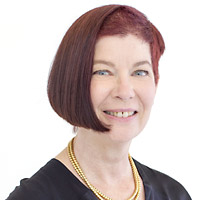Connecting the Unconnected = Access + Openness + Inclusion + Innovation
by Mitchell Baker, Executive Chairwoman, Mozilla
IEEE Internet Initiative eNewsletter, November 2016
Access to the Internet changes lives. Internet access brings vast new possibilities in nearly every aspect of life – from the individual and community level, to business growth and better governance. For decades, we have experienced this positive evolution, and seen the effect on Internet-connected geographies around the world.
Yet half of humanity lacks these opportunities, and the effects are significant. For instance, gender gaps in Internet access correlates with gender gaps in access to education. Women are about 50% less likely to be connected than men in the same age group with similar levels of education and household income. The disproportionate costs of access mean even those who are rising from poverty cannot access the Internet. For context, over two billion people still live on about US$3/day and data prices soar to over US$60/Mb/second in places like India and US$1,760/month for a subscription in Cuba.
This must change. It can change. Seminal reports from McKinsey, Brookings, and the World Economic Forum address the complex and multidimensional drivers of barriers to Internet access in the following way:
- Incentives: Lack of relevant (local or localized) content and services, and a lack of cultural or social acceptance
- Low Income and Affordability: Poverty, expensive devices, high telecom fees
- User Capability: Digital literacy and lack of digital trust
- Infrastructure: Limited access to international bandwidth, an underdeveloped national core IT network, limited spectrum availability.
These reports provide a meaningful framework for understanding the challenges, but we’re often left without a path from finding solutions. I believe the kind of change we need is part technology, part open systems, part business, and part human will and ingenuity to get things done. It’s an area where IEEE members have enormous expertise. It’s an area where we believe the power of decentralized solutions developed by people in the field solving problems can play a huge role if they can find, connect, and support each other.
A point of view
Like many of you, at Mozilla we have been focusing our resources on a blend of activities around policy making, research, and product development. After years of exploring this topic, we have several key conclusions:
1) We need to broaden the conversation.
Historically, much of the conversation around connectivity has been through the lenses of:
- hugely expensive infrastructure projects
- the inability or unwillingness of new consumers to pay for the data charges
On the one hand, this has resulted in daunting political battles about funding long term government-led projects. And on the other hand, there has been a birth of new offerings based on partnerships between telecommunications and content providers which offer access to parts of the Internet for free or a reduced price. Unfortunately these offerings limit and censor parts of the Internet, and enable a few large organizations to influence what content people are able to consume.
We believe existing approaches that may be too centered on massive infrastructure solutions that are cost prohibitive, or too focused on affordability where we may be forced to make unattractive compromises.
2) Access to the open Internet is different.
We respect many of the ambitious ongoing efforts around providing access to the Internet, but we have seen that providing a partial version of the Internet does not yield the same social, educational, gender, and economic benefits that providing access to the full diversity of the open Internet does.
About a year and a half ago we began using the term “equal rating” to describe a system where all data is transmitted at the same price, whether that price is “zero” or anything else. A consumer may pay all the costs of her / his data use, there may be a partial subsidy, or a complete subsidy where data is free. Whatever the case, the underlying system should be content-agnostic, not subject to gatekeepers, and did not based on “pay-for-play” provisions. Digital inclusion, digital literacy, open systems and opportunity are all critical components to experiencing and creating online.
3) This isn’t a problem solved by experts alone.
Social innovation requires diverse participants and novel ideas. We need new thinking and innovation. And this “we” means all of us, including those who are brand new to this challenge. We need creative alternatives to existing business and technology solutions that aren’t bound by conventional wisdom and the scar tissue of past efforts. We need to inject practical, action-oriented, new thinking into the current efforts. And in addition we need to shift our mindset to imagine a broader set of possible solutions.
An Experiment: Open Innovation, hosted by Mozilla
To spur these conversations and this community-building activity, Mozilla is launching an experiment based on our learnings. We have designed the Equal Rating Innovation Challenge to spur innovation in bringing the next wave of people online. We are encouraging entrepreneurs, designers, researchers, and innovators from all locations to propose creative, engaging and scalable ideas that cultivate digital literacy and provide affordable access to the full diversity of the open Internet. We hope to get proposals for products, services, and even business models that tackle myriad aspects of this complex but incredibly important challenge.
In order to draw in diverse and creative solutions, we hope to build new connections between people who have been working on this challenge for some time and people for whom this focus in newer. We have built an information portal for the innovation challenge. This resource brings together frameworks, reports, and studies on global Internet adoption and access so that someone new to the topic can quickly ramp up and start ideating.
We will support the best proposed solutions through expert mentorship and funding of US$250,000. This level of funding may be everything a team needs to go to market with a consumer product, or it may provide just enough support for team to unlock further funding for an infrastructure project. We are committed to solutions based on local knowledge and especially encourage individuals and teams from all over the globe to apply.
We are not expecting to find a single, near-magical solution that can bring everyone online. We hope that our approach the Equal Rating Innovation Challenge will help spur grassroots, distributed innovation that identifies many solutions. We know that the IEEE membership has rich expertise and potential contributions to expanding Internet access for the benefit of humanity. We hope this social innovation experiment will spawn others, but mostly draw in new energy and thinking into one of the most critical challenges of our time.
 Mitchell Baker
Mitchell Baker
Mitchell Baker co-founded the Mozilla Project to support the open, innovative web and ensure it continues offering opportunities for everyone. As Executive Chairwoman of Mozilla, Mitchell Baker is responsible for organizing and motivating a massive, worldwide, collective of employees and volunteers around the world who are building the Internet as a global public resource, open and accessible to all. Mitchell is deeply engaged in developing product offerings that promote the mission of empowering individuals. She also guides the overall scope and direction of Mozilla’s mission.
Mitchell is a Board Member for the OpenMRS and is an MIT Media Lab Research Affiliate, Open Agriculture Initiative. She co-chairs the U.S. Department of Commerce Digital Economy Advisory Board and serves on the United Nations High Level Panel on Women’s Economic Empowerment.
In 2012, Mitchell was inducted into the founding group of the Internet Society’s Hall of Fame. TIME Magazine profiled Mitchell in its global list of “100 Most Influential People”; Bloomberg listed her as one of the “25 Most Influential People on the Web”. She was the winner of the Anita Borg Institute’s 2009 Women of Vision Award and received the Aenne Burda Award for Creative Leadership in 2010.
Editor:
 Dr. Ali Kashif Bashir
Dr. Ali Kashif Bashir
Dr. Ali Kashif Bashir is an academician, an entrepreneur, and a consultant. He received his Ph.D. in Computer Science and Engineering from Korea University, South Korea. He is currently working for Graduate School of Information Science and Technology, Osaka University. Here, he is working on projects of Nippon Telegram and Telephone (NTT), Japan and National Institute of Information and Communication Technology (NIC), Japan. He is also attached to National Institute of Technology, Nara, Japan as a Visiting Professor. Furthermore, he is serving few projects as a consultant. His previous assignments includes: Researcher, National Fusion Research Institute, South Korea; Mentor, Seoul Metropolitan Government; and Consultant, Korea Southern Power Co. Ltd, South Korea.
Dr. Ali is a senior member of IEEE and active member of ACM and IEICE. He has given several invited and keynote talks and is a reviewer of top journals and conferences. Furthermore, he is editorial board member of IEEE Access and Journal of Sensor Networks and Data Communications. His research interests includes: cloud computing (NFV/SDN), network virtualization, IoT, network security, wireless networks, etc. He is actively involved in ETAP working groups of IEEE Internet Initiative. He is also serving IEEE Internet Initiative eNewsletter as editor in chief.
Article Contributions Welcomed
If you wish to have an internet policy related article considered for publication, please contact the Managing Editor of Technology Policy and Ethics IEEE Future Directions Newsletter.
Past Issues
IEEE Internet Policy Newsletter Editorial Board
Dr. Ali Kashif Bashir, Interim Editor-in- Chief
Dr. Syed Hassan Ahmed
Dr. Mudassar Ahmad
Dr. Onur Alparslan
Dr. Muhammad Bilal
Dr. Syed Ahmad Chan Bukhari
Dr. Ankur Chattopadhyay
Dr. Junaid Chaudhry
Dr. Waleed Ejaz
Dr. Yasir Faheem
Dr. Prasun Ghosal
Dr. Tahir Hameed
Dr. Y. Sinan Hanay
Dr. Shagufta Henna
Dr. Fatima Hussain
Dr. Rasheed Hussain
Dr. Saman Iftikhar
Dr. Stephan Jones
Dr. Mohammad Saud Khan
Olga Kiconco
Dr. Jay Ramesh Merja
Dr. Mubashir Husain Rehmani
Dr. Hafiz Maher Ali Zeeshan
About: This newsletter features technical, policy, social, governmental, but not political commentary related to the internet. Its contents reflect the viewpoints of the authors and do not necessarily reflect the positions and views of IEEE. It is published by the IEEE Internet Initiative to enhance knowledge and promote discussion of the issues addressed.


